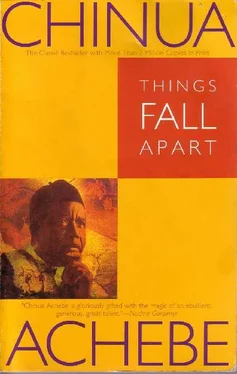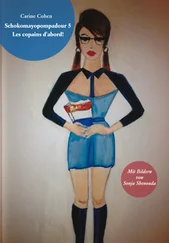Chinua Achebe - Things Fall Apart
Здесь есть возможность читать онлайн «Chinua Achebe - Things Fall Apart» весь текст электронной книги совершенно бесплатно (целиком полную версию без сокращений). В некоторых случаях можно слушать аудио, скачать через торрент в формате fb2 и присутствует краткое содержание. Город: New York, Год выпуска: 1994, Издательство: A DIVISION OF RANDOM HOUSE, INC., Жанр: Контркультура, на английском языке. Описание произведения, (предисловие) а так же отзывы посетителей доступны на портале библиотеки ЛибКат.
- Название:Things Fall Apart
- Автор:
- Издательство:A DIVISION OF RANDOM HOUSE, INC.
- Жанр:
- Год:1994
- Город:New York
- ISBN:нет данных
- Рейтинг книги:2 / 5. Голосов: 2
-
Избранное:Добавить в избранное
- Отзывы:
-
Ваша оценка:
- 40
- 1
- 2
- 3
- 4
- 5
Things Fall Apart: краткое содержание, описание и аннотация
Предлагаем к чтению аннотацию, описание, краткое содержание или предисловие (зависит от того, что написал сам автор книги «Things Fall Apart»). Если вы не нашли необходимую информацию о книге — напишите в комментариях, мы постараемся отыскать её.
—W. B. Yeats, "The Second Coming"
Things Fall Apart — читать онлайн бесплатно полную книгу (весь текст) целиком
Ниже представлен текст книги, разбитый по страницам. Система сохранения места последней прочитанной страницы, позволяет с удобством читать онлайн бесплатно книгу «Things Fall Apart», без необходимости каждый раз заново искать на чём Вы остановились. Поставьте закладку, и сможете в любой момент перейти на страницу, на которой закончили чтение.
Интервал:
Закладка:
"I cannot understand why you refused to come with us to kill that boy," he asked Obierika.
"Because I did not want to," Obierika replied sharply. "I had something better to do."
"You sound as if you question the authority and the decision of the Oracle, who said he should die."
"I do not. Why should I? But the Oracle did not ask me to carry out its decision."
"But someone had to do it. If we were all afraid of blood, it would not be done. And what do you think the Oracle would do then?"
"You know very well, Okonkwo, that I am not afraid of blood/ and if anyone tells you that I am, he is telling a lie. And let me tell you one thing, my friend. If I were you I would have stayed at home. What you have done will not please the Earth. It is the kind of action for which the goddess wipes out whole families."
"The Earth cannot punish me for obeying her messenger," Okonkwo said. "A child's fingers are not scalded by a piece of hot yam which its mother puts into its palm."
"That is true," Obierika agreed. "But if the Oracle said that my son should be killed I would neither dispute it nor be the one to do it."
They would have gone on arguing had Ofoedu not come in just then. It was clear from his twinkling eyes that he had important news. But it would be impolite to rush him. Obierika offered him a lobe of the kola nut he had broken with Okonkwo. Ofoedu ate slowly and talked about the locusts. When he finished his kola nut he said:
"The things that happen these days are very strange."
"What has happened?" asked Okonkwo.
"Do you know Ogbuefi Ndulue?" Ofoedu asked.
"Ogbuefi Ndulue of Ire village," Okonkwo and Obierika said together.
"He died this morning," said Ofoedu.
"That is not strange. He was the oldest man in Ire," said Obierika.
"You are right," Ofoedu agreed. "But you ought to ask why the drum has not beaten to tell Umuofia of his death."
"Why?" asked Obierika and Okonkwo together.
"That is the strange part of it. You know his first wife who walks with a stick?"
"Yes. She is called Ozoemena."
"That is so," said Ofoedu. "Ozoemena was, as you know, too old to attend Ndulue during his illness. His younger wives did that. When he died this morning, one of these women went to Ozoemena's hut and told her. She rose from her mat, took her stick and walked over to the obi . She knelt on her knees and hands at the threshold and called her husband, who was laid on a mat. 'Ogbuefi Ndulue,' she called, three times, and went back to her hut. When the youngest wife went to call her again to be present at the washing of the body, she found her lying on the mat, dead."
"That is very strange, indeed," said Okonkwo. "They will put off Ndulue's funeral until his wife has been buried."
"That is why the drum has not been beaten to tell Umuofla."
"It was always said that Ndulue and Ozoemena had one mind," said Obierika. "I remember when I was a young boy there was a song about them. He could not do anything without telling her."
"I did not know that," said Okonkwo. "I thought he was a strong man in his youth."
"He was indeed," said Ofoedu.
Okonkwo shook his head doubtfully.
"He led Umuofia to war in those days," said Obierika.
Okonkwo was beginning to feel like his old self again. All that he required was something to occupy his mind. If he had killed Ikemefuna during the busy planting season or harvesting it would not have been so bad,– his mind would have been centered on his work. Okonkwo was not a man of thought but of action. But in absence of work, talking was the next best.
Soon after Ofoedu left, Okonkwo took up his goatskin bag to go.
"I must go home to tap my palm trees for the afternoon," he said.
"Who taps your tall trees for you?" asked Obierika.
"Umezulike," replied Okonkwo.
"Sometimes I wish I had not taken the ozo title," said Obierika. "It wounds my heart to see these young men killing palm trees in the name of tapping."
"It is so indeed," Okonkwo agreed. "But the law of the land must be obeyed."
"I don't know how we got that law," said Obierika. "In many other clans a man of title is not forbidden to climb the palm tree. Here we say he cannot climb the tall tree but he can tap the short ones standing on the ground. It is like Dimaragana, who would not lend his knife for cutting up dogmeat because the dog was taboo to him, but offered to use his teeth."
"I think it is good that our clan holds the ozo title in high esteem," said Okonkwo. "In those other clans you speak of, ozo is so low that every beggar takes it."
"I was only speaking in jest," said Obierika. "In Abame and Aninta the title is worth less than two cowries. Every man wears the thread of title on his ankle, and does not lose it even if he steals."
"They have indeed soiled the name of ozo ," said Okonkwo as he rose to go.
"It will not be very long now before my in-laws come," said Obierika.
"I shall return very soon," said Okonkwo, looking at the position of the sun.
There were seven men in Obierika's hut when Okonkwo returned. The suitor was a young man of about twenty-five, and with him were his father and uncle. On Obierika's side were his two elder brothers and Maduka, his sixteen-year-old son.
"Ask Akueke's mother to send us some kola nuts," said Obierika to his son. Maduka vanished into the compound like lightning. The conversation at once centered on him, and everybody agreed that he was as sharp as a razor.
"I sometimes think he is too sharp," said Obierika, somewhat indulgently. "He hardly ever walks. He is always in a hurry. If you are sending him on an errand he flies away before he has heard half of the message."
"You were very much like that yourself," said his eldest brother. "As our people say, 'When mother-cow is chewing grass its young ones watch its mouth.' Maduka has been watching your mouth."
As he was speaking the boy returned, followed by Akueke, his half-sister, carrying a wooden dish with three kola nuts and alligator pepper. She gave the dish to her father's eldest brother and then shook hands, very shyly, with her suitor and his relatives. She was about sixteen and just ripe for marriage. Her suitor and his relatives surveyed her young body with expert eyes as if to assure themselves that she was beautiful and ripe.
She wore a coiffure which was done up into a crest in the middle of the head. Cam wood was rubbed lightly into her skin, and all over her body were black patterns drawn with uli . She wore a black necklace which hung down in three coils just above her full, succulent breasts. On her arms were red and yellow bangles, and on her waist four or five rows of jigida , or waist beads.
When she had shaken hands, or rather held out her hand to be shaken, she returned to her mother's hut to help with the cooking.
"Remove your jigida first," her mother warned as she moved near the fireplace to bring the pestle resting against the wall. "Every day I tell you that jigida and fire are not friends. But you will never hear. You grew your ears for decoration, not for hearing. One of these days yourjigida will catch fire on your waist, and then you will know."
Akueke moved to the other end of the hut and began to remove the waist-beads. It had to be done slowly and carefully, taking each string separately, else it would break and the thousand tiny rings would have to be strung together again. She rubbed each string downwards with her palms until it passed the buttocks and slipped down to the floor around her feet.
The men in the obi had already begun to drink the palm-wine which Akueke's suitor had brought. It was a very good wine and powerful, for in spite of the palm fruit hung across the mouth of the pot to restrain the lively liquor, white foam rose and spilled over.
Читать дальшеИнтервал:
Закладка:
Похожие книги на «Things Fall Apart»
Представляем Вашему вниманию похожие книги на «Things Fall Apart» списком для выбора. Мы отобрали схожую по названию и смыслу литературу в надежде предоставить читателям больше вариантов отыскать новые, интересные, ещё непрочитанные произведения.
Обсуждение, отзывы о книге «Things Fall Apart» и просто собственные мнения читателей. Оставьте ваши комментарии, напишите, что Вы думаете о произведении, его смысле или главных героях. Укажите что конкретно понравилось, а что нет, и почему Вы так считаете.












